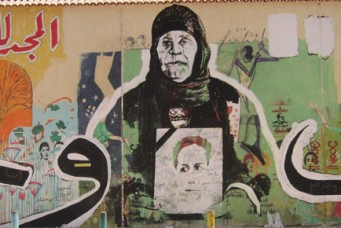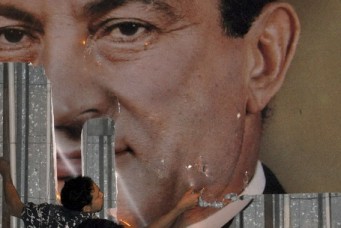My Search for Tahrir Square
Disillusionment with the January 25 revolution and what followed might be the first step towards a better, and more democratic, Egypt.

Graffiti near Tahrir Square in downtown Cairo, August 21, 2014. Amr Abdallah Dalsh/Reuters/Corbis
On January 25, 2011, Egyptians piled into Tahrir Square to demand bread, freedom, justice, and dignity. I watched the events of those eighteen days of revolt unfold from the comfort of my apartment in Arlington, Virginia, calling family in Egypt regularly and gluing myself to every live update.
Born and raised in the United States to Egyptian parents, there was still so much I did not know about Egyptian society. Nonetheless, like many first-generation Americans, I was proud of my Egyptian heritage. The revolution thrilled me because it created a chance for Egypt to reach its potential. My excitement and hope drove me to move to Cairo three years later.
Egypt’s nickname, Um Al-Dunya, or Mother of the World, arises from its historical and cultural significance. Yet over the past sixty years, the country has plunged further and further into a morass of social and economic problems. I had always blamed much of this failure on the rulers that followed its 1952 revolution. The dictatorships of Gamal Abdel Nasser, Anwar Sadat, and Hosni Mubarak had failed to provide basic human rights and civil liberties. The rulers led citizens and much of the world to believe that the choice for Egypt was stark: either authoritarianism or political Islam and religious extremism.
To me, this false binary needed to be destroyed so that a secular, civilian-led political system could be formed from scratch and provide an opportunity for Egypt to thrive. By January 28, 2011, Egyptians from all walks of life had occupied Tahrir Square: doctors, lawyers, ardent soccer fans known as Ultras, workers, and unemployed college graduates educated at top schools. These were not religious extremists calling for Islamic law, but ordinary people seeking to destroy a repressive duality for the sake of their nation’s progress.
My year in Cairo, as a graduate student and journalist from January 2014 to January 2015,was a crash-course in harsh reality. By the time I landed in Cairo, the country was still reeling from a summer of turmoil marked by the military-led ouster of Egypt’s first democratically elected president, Mohammed Morsi, the massacre of over 800 Muslim Brotherhood supporters, and an interim government pending new elections. The regime’s crackdown extended to the secular opposition.
What shocked and disheartened me even more was how so many Egyptians were supportive of the military crackdown. Many of the Egyptians I knew or met—whether my relatives, taxi drivers, businesspeople, or ordinary workers—had spent time protesting in Tahrir Square in 2011. Yet now, to them, it was not a big deal that demonstrations of any kind were illegal without prior authorization, non-governmental organizations were subject to a new law that made their jobs impossible, and artists, journalists, and actors were facing censorship campaigns, travel bans, and arrests. Much of Egypt’s liberal opposition fell in line with the overthrow of Morsi and outlawing of the Brotherhood. The grassroots revolutionaries who once owned Tahrir Square had become disenchanted, or were in jail.
This was not the January 25 I had come looking for. By Ramadan, in a sizzling summer marked by constant power cuts, my initial excitement for the revolution was further tempered. To experience a different Egypt than the one I knew from summer visits to well-to-do Egyptian relatives, I lived in a grubby downtown neighborhood, ate fuul sandwiches off street carts, and relaxed in working class coffee shops. Soon I was struggling to make ends meet, working one copy editing shift per week at an Egyptian news outlet. I came to realize that I had sought to live a life shared by a greater swathe of Egyptians for the novelty of it. But the experience nonetheless provided me with new insight. If Cairo’s difficult living conditions had been my real life, and I could not just hop on a plane back to Virginia, how would I have regarded the January 25 revolution? The risk of demanding political change is high; if you’re barely scraping by as it is, it is even higher.
I began to realize that it wasn’t so shocking that Egyptian liberals were supporting the military’s return to power; many had become terrified that the Muslim Brotherhood was slowly turning Egypt into an Islamic state. Nor was it so surprising that the lower classes were supporting the military; the revolution’s main result for them had been a devastated economy bringing higher prices. The scales had fallen from my eyes. I may be overcome with disappointment, but I gained a better understanding of Egypt’s long road ahead.
Amr Kotb is the Advocacy and External Relations Manager at the Tahrir Institute for Middle East Policy in Washington, DC. He has contributed to CNN, Al Jazeera, and the Atlantic Council’s EgyptSource. On Twitter: @AmrQotb.



